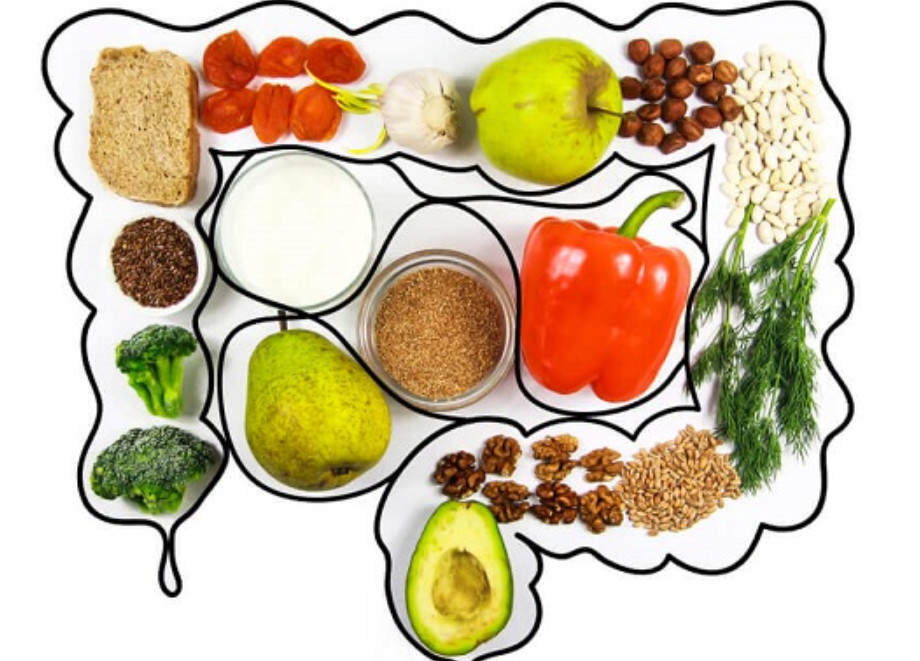A healthy colon requires regular and healthy bowel movements, which is achieved by eating sufficient amounts of dietary fiber to maintain healthy bowel movements and reduce the risk of many other diseases. Colon health foods include:

Fiber-rich foods include:
It is recommended to eat a variety of fruits and vegetables with different colors, such as dark green leafy vegetables, red and orange fruits, and blue or purple fruits, since each color offers different health benefits. Vitamins and vegetables can be consumed fresh, frozen, or canned.
Fruits high in fiber include apples, berries, bananas, oranges, and pears, while vegetables high in fiber include lettuce, kale, cucumbers, artichokes, broccoli, cabbage, carrots, celery, okra, and spinach.
Whole grains: Whole grains are a rich source of nutrients and fiber, which are important for maintaining bowel movements and removing waste, and it is recommended that we consume 90 grams of whole grains a day, including oatmeal, brown rice, whole wheat flour, oats, and quinoa. The benefits of whole grains include vitamins, minerals, essential fatty acids, antioxidants, and phytochemicals. In comparison to refined grains such as white flour and white rice.
Men are recommended to consume 38 grams of fiber per day, while women are recommended to consume 25 grams of fiber per day. Fiber is an important nutrient for overall health and colon health. There are tips and recommendations for increasing it. Dietary fiber consumption:
As much as possible, consume whole grains and minimize refined grains.
Make sure you eat at least five servings of fruits and vegetables each day.
Fiber can be found in legumes, nuts, and seeds.
Fats that are healthy
Olive oil, omega-3-rich salmon, avocados, nuts, and olive oil are recommended healthy fats. Fried foods should be limited.
The results of a 2013 study published in the journal PLoS One showed that dairy products may play a role in reducing the risk of colon cancer, and that effect did not differ based on the fat content of dairy products, and this effect might be due to the fact that dairy products contain components like calcium, lactoferrin, and vitamin D.
Probiotic-containing foods
Probiotics are beneficial bacteria and yeasts naturally found in the body that fight harmful bacteria, control infections, support immune system function, produce vitamins, aid digestion, and line the gut. By doing so, they help prevent the spread of harmful bacteria. Eating a balanced, high-fiber diet helps maintain healthy levels of vital aids since it enters the bloodstream.
In a 2012 review published in BMC Surgery, probiotics were found to reduce colon cancer risk, possibly by inhibiting carcinogenic compounds, competing with pathogens in the gut, and improving immune function.
Foods that are harmful to the colon
The following foods may be harmful to the colon:
The American Institute of Cancer Research recommends consuming no more than 500 grams of red meat per week, 140 grams for women and 113 to 160 grams for men. Likewise, processed meats such as sausage, bacon, and cold meats should be limited.
Drinking alcohol increases cancer risk. People who drink 3.5 alcoholic drinks a day have a 1.5 percent higher risk of developing cancer than people who do not drink alcohol. Colon cancer is a risk for them.
Foods high in sugar are high in calories and can increase the risk of obesity. According to a study published in the Journal of Cancer Epidemiology and Prevention Biomarkers, simple sugars and diets high in simple carbohydrates increase obesity risk. Their negative effects on blood glucose levels may contribute to colon cancer.
Here are some other tips for maintaining colon health:
According to the American Cancer Society, being overweight increases the risk of colon cancer, breast cancer in postmenopausal women, and cancer of the rectum, esophagus, pancreas, and kidneys.
Keeping the body hydrated: To prevent dehydration, a person should drink 1.6-2 liters of fluids per day, equivalent to 6-8 cups. Low-fat milk and water are great options.
Increased physical activity may help reduce the risk of colon cancer in inactive people.
Consume more fiber.
Gluten should be avoided. Gluten can increase symptoms in people with IBS.
It is recommended that you gradually increase the amount of fiber you consume, as it takes time for your body to adjust to the added amounts and eating too much can cause gas, bloating and cramping if you consume too much too soon. Foods rich in fiber are very beneficial for the colon, as we discussed previously. Fiber removes water from the body to move food through the intestines, so if not enough water and fluids are consumed, constipation may occur.


